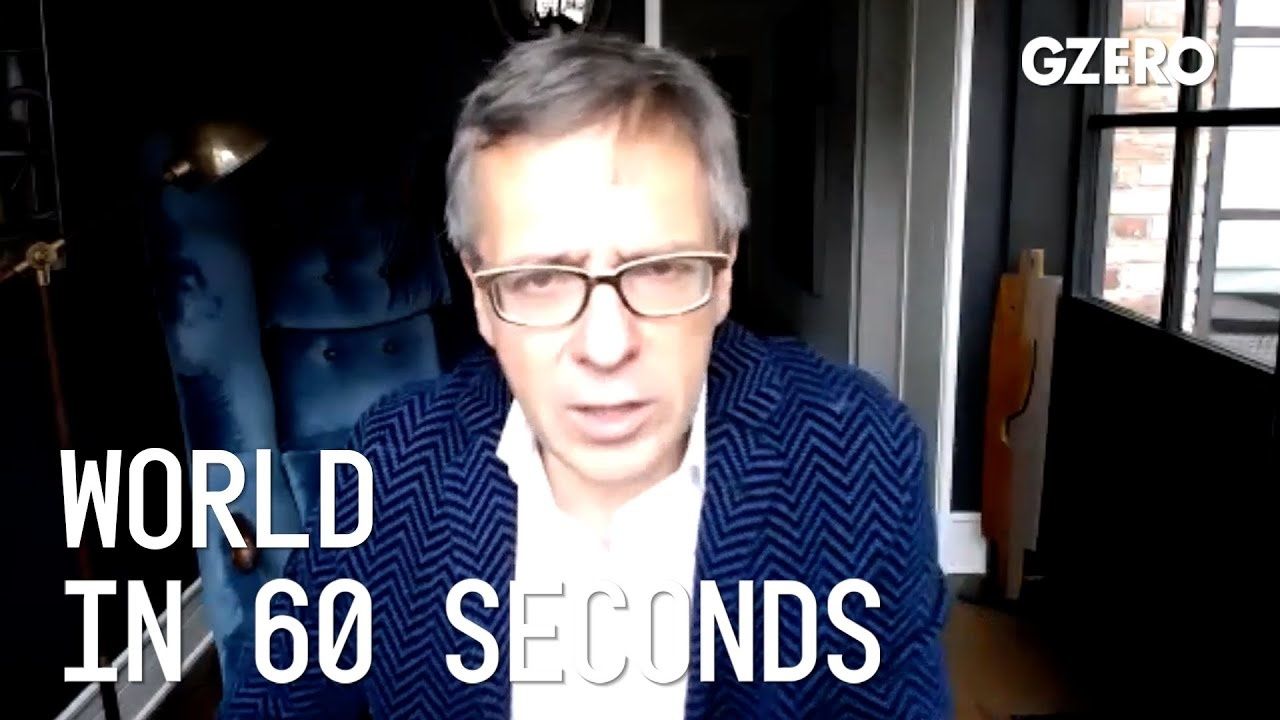
Ian Bremmer shares his perspective on global politics on this week's World In (More Than) 60 Seconds:
Number one, all eyes are on the United States today. What countries are watching most closely?
Well everyone's watching pretty closely, because the US election is two years long and costs billions of dollars and feels like a subversion of democracy. But watching the most closely are the countries that feel like they have the most at stake. So, for example, Iran, if Biden comes in, they're going to have a government that's more interested in trying to reopen the Iranian nuclear deal. Their economy is in free fall right now. They really care about the outcome.
Turkey, facing a much more intense US sanctions regime. The United States under Trump has been kind of friendly towards Erdoğan. They'd be much less so. And again, Turkey's in a lot of trouble right now. Their lira has dropped to record lows. There's massive capital flight. I think the first and foremost countries that are paying the most attention are the ones that are under the most significant pressure, and they know that this election has the potential to make that even worse.
So, countries like China, for example, economically doing pretty well right now, and they're going to have a tough time whether it's Biden or Trump. A country like India, that's going to do pretty well whether it's Biden or Trump. They obviously are paying attention, but I wouldn't say they care quite as much. The United Kingdom, definitely, because the ability to get a trade deal done just with the US if it's Biden is going to be a little more challenging. I think they worry about that. Where you've got countries like Germany and France, where the relationship with Trump has been so toxic, personally, at a personal level, they would just like to have Biden and there'll be a honeymoon. How long that lasts and what it really gets you, perhaps not as much. Oh, that's kind of a, just a smattering of a few countries around the world, but truly everyone paying attention to this, the most important election in the United States in modern history, in part because this crisis is so big and the change in trajectory of US politics under these two leaders would be more substantial than we would normally expect.
What happened in Vienna?
Well, a big terrorist attack. We see four people that have actually been killed, going on all night. Initially, we thought that, the Vienna authorities said there might've been six people involved. It now looks like at least two ISIS supporters that were engaged in these attacks against random Austrian civilians.
We do need to remember that terrorist attacks, the Europeans continue to be much more vulnerable overall, and specifically Islamic extremist terror attacks. A lot more Muslim refugees coming over from countries like Iraq, like Syria, into Turkey, into Europe. They've not integrated well; they've not been integrated well. A lot of them aren't all that welcome and there's been extremism. And some of that extremism has led to serious violence.
In the United States, the threat from terrorism is a lot lower, and to the extent that we see violent terrorism in the US, it is overwhelmingly from white nationalist extremists, not from Islamic violence. You wouldn't necessarily know that from watching the media, and depends on who you're watching, and all of this has become so politicized, but that's the reality in terms of the numbers, and certainly hope that we're able to see a quick response, and anyone else involved is able to be apprehended quickly.
Okay. Finally, is Boris Johnson against the ropes because of his COVID response?
Well, the guy is enjoying an 80-seat majority in Parliament right now. That's a pretty big deal. So even though the British economy is in big trouble, I would not argue that he is facing imminent political crisis, but he has very badly mishandled this. Certainly, the UK is in as bad shape, if not worse, from a healthcare perspective, as the United States. Right now, the per capita cases and hospitalizations in the UK are worse than they are in the United States, they're worse than they are in the EU as a whole, and they've locked down. They said there were not going to be locked downs nationwide. They've now come, and he's had to do a complete about face on that. He's going to say, because the virus got epidemiologically a lot worse than they expected. That may well be the case, but they're in charge. They're responsible for this stuff. So, they haven't handled it well.
And indeed the Labor Opposition Party has been well ahead of Boris Johnson in arguing for these policies. Let's keep in mind also that labor is not being run by Jeremy Corbyn, who was really God awful in terms of leadership. Instead you've had Keir Starmer who's much better. So long-term, a much more competitive landscape politically in the UK, but for now Boris Johnson going nowhere. Unless it turns out that his health is in much worse shape, and there have been some rumors that I've heard that Johnson is indeed suffering from the quote unquote long COVID.
And let's keep in mind that some five, 10% of people that get coronavirus are experiencing much longer serious symptoms, even beyond when they're supposedly better, and whether or not Boris Johnson faces that, it was touch and go as to whether he'd even survive his bout with coronavirus. Much, much worse than what we saw for Trump or from Bolsonaro in Brazil. That's a real question.